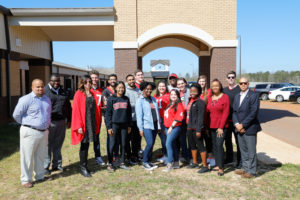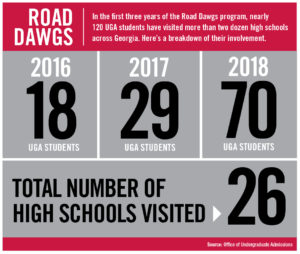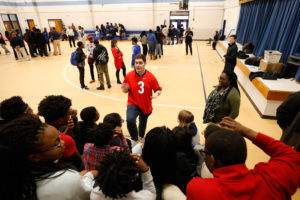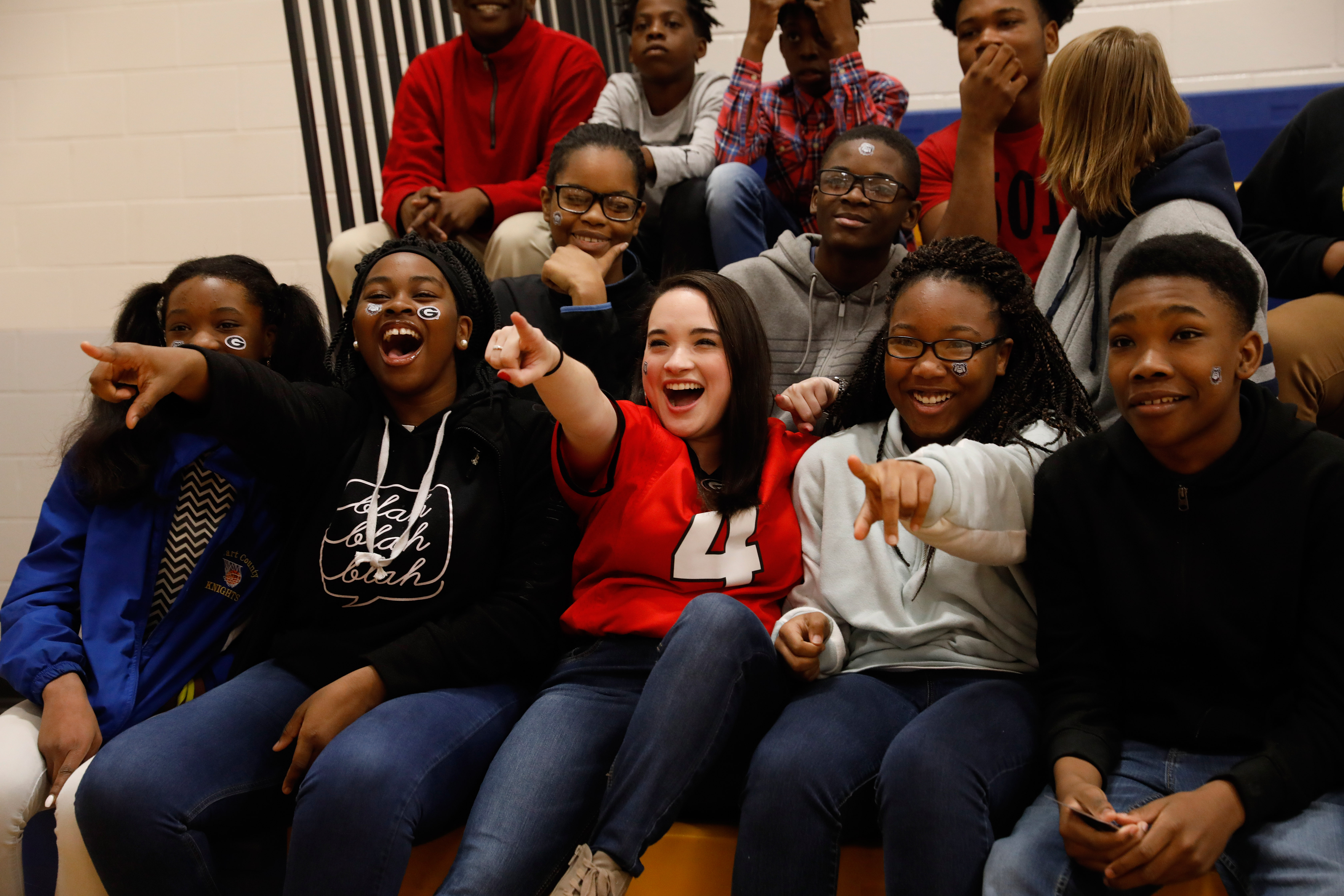Karmen Askew, a senior at Stewart County High School, wants to be a physical therapist one day. Jaquelyne Mencias, a freshman at Maynard Holbrook Jackson High School in Atlanta, is thinking about going into law or a field related to religion and culture.
Both students were able to hear what the University of Georgia has to offer when Road Dawgs visited their schools. More than 70 UGA students gave up their spring breaks to visit six schools around Atlanta, Columbus and Stewart County from March 12-15 to share their college experiences and answer questions.
“I’m still not sure what I want to do, so I asked questions so that I can clarify some things,” Mencias said. “I want to make sure I’m in the right place. If I can find multiple things that I like at the same place, then I’ll have more advantages when I get there.”
Askew echoed a similar sentiment, saying that “they’ve told me what to prepare for and what not to do.”
Road Dawgs is in its third year and continues to expand across the state. In the last three years, UGA students visited a total of 26 schools. This year, the group went to six schools—four in Atlanta, one in Columbus and one in Stewart County. The visit to Columbus and Stewart County was the first overnight trip for the Road Dawgs and an important way to reach high school students who might not be considering UGA as an option after graduation.

“Stewart County is one of the most highly impoverished areas in the state of Georgia,” said Joseph Gardner, principal of Stewart County High School and assistant superintendent of the Stewart County School District. “Exposure is key to our students. Getting them exposed to college and to life after high school—this helps them so much.”
Michelle Sanchez, guidance director at Spencer High School in Columbus, sees the value in having UGA students travel to southwest Georgia.
“Coming into the school and letting them see their peers—I think that gives them more of a connection to the process,” she said. “For these students to give up their spring break to come and inspire and motivate other students—it means a lot to us.”
That is particularly true for Spencer High School senior Ja’von Holmes. He recently accepted his admittance to UGA to study computer science and joined the Road Dawgs to share his story with his fellow students. Holmes also said he wants to get involved with UGA’s Student Government Association and model United Nations.
“I feel like, with Road Dawgs, we’re all learning together. They share what they’ve learned instead of just what’s in black and white on paper,” he said.
 The number of Road Dawg participants continues to grow. During its first year, 18 UGA students participated, and that number more than tripled this year. Not only does it help the high school students they speak with understand what is ahead, but it also helps the UGA students sharpen their public speaking skills and develop lasting friendships. In fact, Road Dawgs often leads to other leadership opportunities at the university.
The number of Road Dawg participants continues to grow. During its first year, 18 UGA students participated, and that number more than tripled this year. Not only does it help the high school students they speak with understand what is ahead, but it also helps the UGA students sharpen their public speaking skills and develop lasting friendships. In fact, Road Dawgs often leads to other leadership opportunities at the university.
“It’s definitely rewarding,” said Alondra Garcia, who graduates in May with a bachelor’s degree in marketing and a certificate in music business. “I wouldn’t spend spring break any other way.”
The mission of Road Dawgs is to make high school students aware of the possibilities of their future and empower them to make decisions for a better life, and that starts with education after high school.
“Through our engagement with the student body, one of the things we consistently heard is that our students wanted to do more to recruit the next generation,” said Arthur Tripp, assistant to the president. “This was an idea that was originally developed by our students.”
Each Road Dawgs program begins with UGA students walking in to a cheer. Then, a few Road Dawgs share their own experiences and answer questions from the audience during a panel discussion. After that, the UGA students go out into the audience for smaller group sessions.
“Everybody’s story is different and unique,” Tripp said. “When you can pull out the stories from our students and share that, it reaches people and shows what’s possible, regardless of your background. You write your own story.”
The program ends with Road Dawgs teaching high school students to “call the Dawgs” before handing out souvenirs of their visit. High school students complete information cards during the program so that the Office of Undergraduate Admissions staff can reach out to them later.
“We think of it as planting the seed, particularly among freshmen, sophomores and juniors in high school,” said Rosa Arroyo Driggers, assistant director of undergraduate admissions.

According to Tripp and Driggers, the small group sessions are where the most meaningful conversation takes place. The high school students feel free to ask specific questions, which can range from scholarship information to campus culture.
“I feel like I would have benefited a lot from hearing directly from students and what their experience has been like at UGA,” said Andrea Zayas, a Road Dawg participant who graduates in May with a bachelor’s degree in finance. “What makes me really proud is thinking that maybe I was able to touch one or two future students and get them to start the process of getting to UGA.”
It was important for students like Zayas and Garcia, a first-generation college student, to share their stories and help high school students understand the ways UGA is continuing to recruit the best and the brightest from the state of Georgia.
“Road Dawgs demonstrates our strong commitment to ensuring that the students at UGA are reflective of the citizens across the state of Georgia,” said Michelle Garfield Cook, vice provost for diversity and inclusion and strategic university initiatives and chief diversity officer. “It gives the high school students we’ve visited a fresh look at themselves and an opportunity to see themselves reflected in successful ways—perhaps in ways they had not conceptualized. By seeing our students, who are keenly interested in their success, they’re able to look in the eyes of a near-peer and see that ‘this could be me.’ ”


